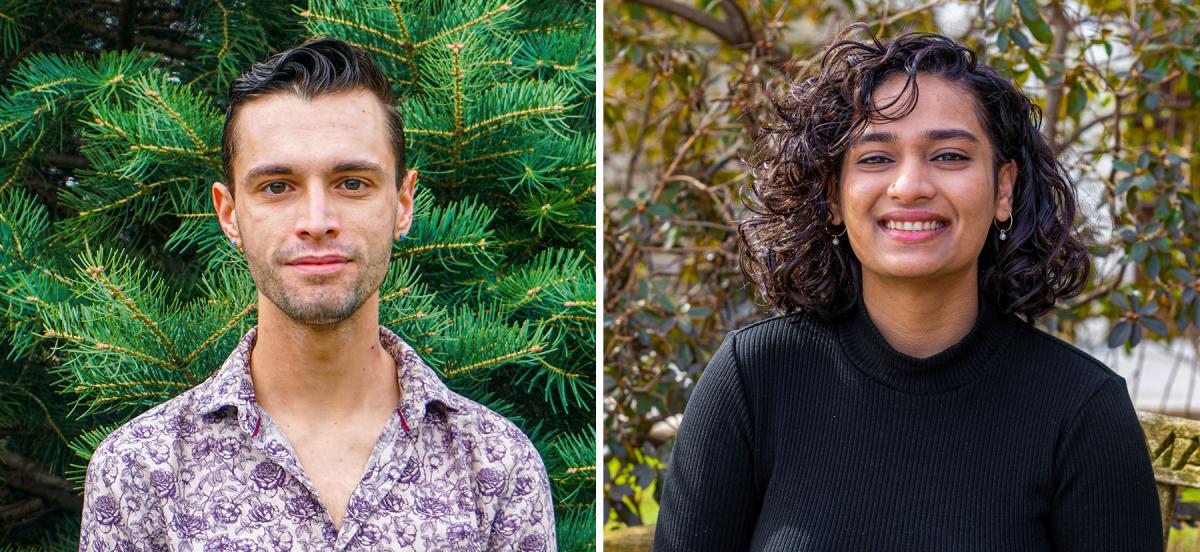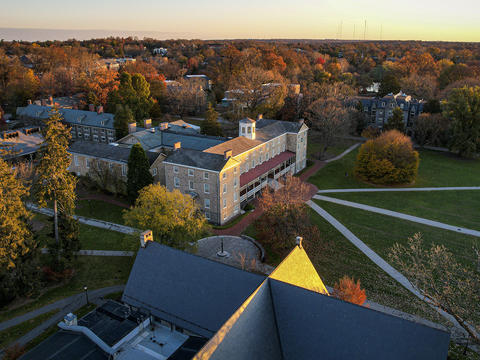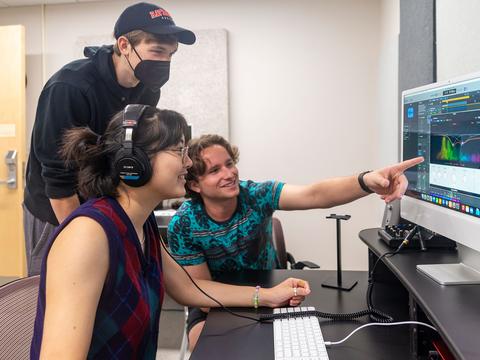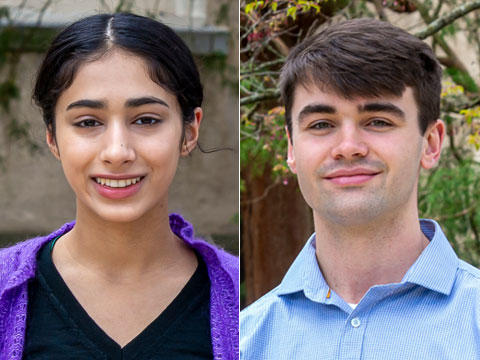Two Seniors Win Watson Fellowships

Political science majors and graduating seniors Joseph Stein (left) and Soha Saghir will embark on a year of independent research and travel thanks to their recent Watson Fellowships. Photo by Reesha Gandhi '24/Patrick Montero.
Details
Soha Saghir and Joseph Stein will spend the next year traveling the world in pursuit of independent research projects cultivated on a global scale thanks to the $36,000 award.
Two members of the Class of 2021, Soha Saghir and Joseph Stein, have been awarded Thomas J. Watson Fellowships, which fund a year of independent exploration and international travel for newly graduated college students. They are two of the 42 graduating seniors selected for the 53rd class of the prestigious fellowship who hail from 22 states, 8 countries, and 30 colleges. Watson Fellows are selected from nominations from 41 partner colleges across the U.S. and receive $36,000 each to support purposeful, independent exploration outside the country.
Saghir, who has known she wanted to apply for a Watson Fellowship since her first year at Haverford, will spend next year visiting New Zealand, India, Egypt, Ethiopia, Germany, France, and Canada to observe and engage with Muslim communities around the world to better understand their relationships with violence and the healing and peacebuilding practices that they prefer.
“The day I decided on my issue of exploration for the Watson was March 15, 2019,” says the political science major from Karachi, Pakistan. “I woke up to the news of a mosque massacre in Christchurch, New Zealand. A white supremacist attack on the Friday congregation had claimed 50 lives, injured over 40, and the tolls were rising. It was spring break and my dorm was empty except for me, and I remember spending my day feeling scared and angry. Also confused over how Muslims around the world are surveilled and associated with violence perpetration when really, they’re more often than not at the receiving end of both state and non-state violence. By the end of the day, I knew that my anger and confusion needed an avenue for exploration, and that the Watson would serve as that perfectly.”
As she travels, Saghir plans to reach out to local communities via mosques, shrines, community centers, and associations, adopting a cross-sectional lens to engage with Muslims of various nationalities, ethnicities, races, and sects.
This kind of work is a continuation of the broader themes of her Haverford education, which has been focused on conflict resolution and reconciliation. Her senior thesis on inter-state mediation in international conflicts uses the roles of Algeria in 1981 Algerian Accords between the U.S. and Iran and Pakistan in the ongoing U.S.-Taliban negotiations as case studies. Outside of the classroom, too, she has focused on similar restorative work, leading a conflict-mediation workshop at the 2019 Nobel Peace Summit and serving as a Customs Peer Awareness Facilitator and on Honor Council for the majority of her time on campus.
“My academic work has been geared towards understanding the world at large and my place within it, and then developing critical thinking skills to leverage that positionality in order to leave the world a little less scarred than I’ve found it,” said Saghir, who also minored in economics and concentrated in peace, justice, and human rights. “...While I didn’t plan on it, I have been drawn to—and decent at—all things mediation related. Hence, they all also tie into my Watson, which essentially wants to explore means of mediating internal and external conflict.”
Inspired by his home town of Boulder, Colo., Stein wants to travel to Iceland, Canada, the Andes, the Himalaya, the Caucasus, and the Alps, to better understand how the people that live there are dealing with melting glaciers, sea-ice, and permafrost caused by climate change.
“I've been troubled by melting ice for almost my entire life,” said the political science major. “Boulder… relies on glacial melt for drinking water, so the threat of glacial collapse is very immediate to me. As soon as I heard about the Watson, at some point during my freshman year, I knew that I wanted to apply, and I knew exactly what my project would be, because ice is always at the back of my mind. I have no idea how to respond to the melting of the glaciers I have lived with: what kind of grief is appropriate, what kind of politics might we want to pursue, what we should say to one another? So I want to meet some people who are also asking those questions, and who have hopefully made a little more progress than I have in responding to them.”
Of all the places on his proposed itinerary, Stein, a member of Quaker House who serves on the Committee for Environmental Responsibility and who organized a Virginia Woolf reading group through the Hurford Center, is particularly excited to travel to Iceland.
“Icelanders have held glacier funerals to mark the collapse of their ice, and also have a long literary tradition that attends to ice,” he said. “My perception—which may not be accurate, I've never been to Iceland!—is that there's thinking and action happening in the intersection of Icelandic political and literary circles around ice, which is fascinating!”
“I am very excited for our two selected Watson Fellows,” said Amy Feifer, dean of Career and Professional Advising and Haverford’s Watson liaison. “What made Soha and Joseph stand out as candidates in the national selection is their deep-seated and long-standing interest in their topics. This genuine passion for their topics will allow them to connect with the many people they will meet on their travels in a meaningful and inspirational way.”
Over 3000 Watson Fellows have been named since the inaugural class in 1969. 66 Haverford students have won the fellowship since 1973. A Watson Year provides fellows with the opportunity to test their aspirations and abilities through a personal project experienced on an international scale. Watson Fellows are leaders in their communities and fields, including CEOs, college presidents, community organizers, Emmy-, Grammy-, and Oscar-award winners, artists, diplomats, entrepreneurs, faculty, journalists, lawyers, politicians, physicians, researchers, and influential social advocates.



